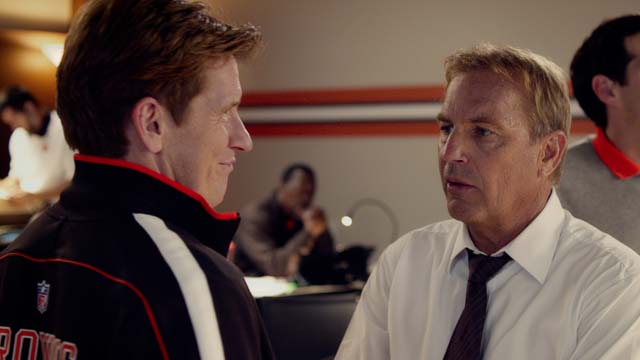


I must admit that seeing Kevin Costner on billboards for the NFL-themed Draft Day gave me pause. His best movies, in my mind at least, were the 1-2 punch of Bull Durham in 1988 and Field of Dreams in 1989. He also made another baseball movie, For Love of the Game in 1999, but that always seemed like the baseball equivalent of Rocky V: The less said about it the better.
Crash Davis and Ray Kinsella are two of the most memorable baseball characters we’ll ever see on the silver screen. The fact that Kevin Costner played them both enshrines him in the movie version of Cooperstown, if there was such a thing. As I wrote earlier, there were some pretty good baseball movies that came out in between these two films, but it was Costner’s roles as a past-his-prime minor league catcher, and a baseball believer who built it (and they came), that will be the standard against which future sports movies — at least 75 percent of which will be baseball movies — will be measured against.
I understand that Kevin Costner is an actor, and work is work. A football-related script came across his desk, and he probably figured “why not do it?” And after making three baseball films, there isn’t much left for him to do in this sport, anyway. The NFL gave its blessing to the project, and the result, apparently, was that the script wasn’t believable, or the idea of a football draft is too “niche,” or Costner is past his prime, or whatever other gripes I’ve been reading online.
But the bottom line — the only one that Hollywood cares about — is $50 million went into making the movie, and maybe $20 million will be coming back after the opening weekend. It could squeeze out a bit more in the coming few weeks, and will sell a few copies on DVD and Netflix, and whatever other revenue streams are out there for movies these days. But the results show that football does not translate into a compelling story onscreen.
The players go and play their game on Sundays, and the league’s marketing machine makes these games into the cultural phenomenon they are. But to create an ancillary story about the game that drives people to spend their hard-earned dollars to see it in a theater is another matter altogether.
I read some suggestions that the film’s association with the Cleveland Browns is what did the film in. But the movie’s marketing made it clear this was an NFL film, and whether the Browns, Steelers or Patriots were involved was besides the point. A football fan, who couldn’t wait to see his game on the screen, didn’t care one bit about what the story line was. If you film it they will come, the thinking went. Except they didn’t actually come.
It’s hard to suggest that football hasn’t surpassed baseball in some measures of fan interest. The Super Bowl is a cultural event in the way the World Series is not. An individual football game gets higher TV ratings than a baseball game. And football stadiums tend to be larger and more raucous than their baseball counterparts. But be that as it may, football teams simply couldn’t play a game every single day, for six months straight, the way baseball does. And baseball movies are simply more numerous — and more compelling — than football, basketball and every other sport combined.
Am I preaching to the choir about this, on a baseball-related website? Of course I am. But the numbers don’t lie, and Kevin Costner’s standing as an icon of baseball-related movies remains intact. His foray into football films is clearly another story.





